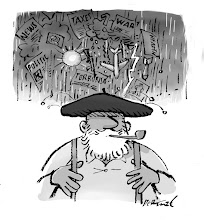Ramón María del Valle-Inclán y de la Peña (1866 – 1936), Spanish dramatist, novelist and member of the Spanish Generation of 98 , is considered perhaps the most noteworthy and certainly the most radical dramatist working to subvert the traditionalism of the Spanish theatrical establishment in the early part of the 20th century. His drama is made all the more important by its influence on later generations of Spanish dramatists. Therefore, on the national theater day, his statue in Madrid receives the homage of the theatrical profession.
His early writings were in line with French symbolism and modernism; his later works became radical formal experiments. His political views changed from traditional absolutism (in Spain known as Carlismo) towards anarchism. This also caused him problems.
All his life he struggled to live up to his bohemian ideals, and stayed loyal to his steticist beliefs. During a row with a fellow writer his wrist was wounded and became infected, and he lost his arm.
In addition to being politically subversive, though, Valle-Inclán's plays often required staging and direction that went far beyond the abilities of many companies working in the commercial theatre, often featuring complex supernatural special effects and rapid, drastic changes of scene. For this reason, some of his works are regarded as closet dramas.
Due to a lack of translations his work is still largely unknown in the English-speaking world.
Saturday, July 23, 2011
Subscribe to:
Post Comments (Atom)








No comments:
Post a Comment